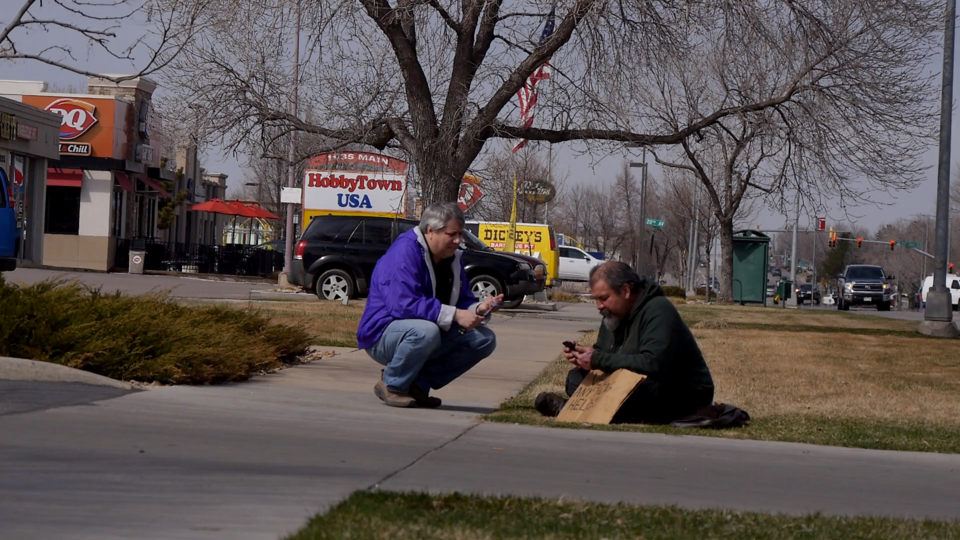Colorado’s winter is underway and though most of the snow is melted from Longmont’s last snowfall, cold conditions add to the challenges faced by the unhoused community. In Longmont and Boulder County, there are programs through governments and nonprofits to connect the homeless with resources and shelter, many of which work together to provide for a community in need.
Homeless Outreach Providing Encouragement, or HOPE, has an overnight shelter and a SafeLot for people living out of their cars, along with a day shelter and client advocates to help people find jobs, get ID and any medical assistance they may need.
According to HOPE Director Alice Sueltenfuss, the nonprofit also is now managing the coordinated entry program in Longmont. Coordinated entry services help find permanent housing solutions for those who need it.
HOPE staff and volunteers do street outreach at least four times a week, Sueltenfuss said. The teams go out before the sun goes down, bringing people to overnight shelters or providing them with blankets and sleeping bags.
“We try to get out there before dark because we know some people have already figured out where they are going to go,” Sueltenfuss said. “The afternoon is the best time for us to find people who are vulnerable and we can see if they have a safe place to go.”
HOPE works with Longmont’s Crisis Outreach Response and Engagement, or CORE, team to provide pop-up medical clinics Wednesday nights, Sueltenfuss said. The clinics are hosted at the Journey Church, 2000 Pike Road, where HOPE has an overnight shelter during the week.
The nonprofit also works with Longmont’s Law Enforcement Assisted Diversion, or LEAD, team to connect with unhoused clients. Sueltenfuss said those connections help create a network for the coordinated entry program but the work is ongoing.
The organizations want to help as many people as possible, but not all of the unhoused community are comfortable going to shelters or finding employment. According to Sueltenfuss and Longmont Police Officer Dave Kennedy, many struggle with mental health issues and the shelters aren’t always comfortable environments.
“We do have some chronically homeless individuals who live with us that have issues around mental illness. In the United States we are not quick with having ready services for mental health like we need, so people end up self-medicating,” Sueltenfuss said.
Kennedy said Longmont emergency responders take people to shelters at night, usually at HOPE but sometimes in Boulder when necessary. Kennedy has worked with the homeless community for a number of years now and has seen a number of themes come up with individuals unwilling to go to shelters, even on cold nights.
“Some of the common themes I’ve heard are safety concerns or not wanting to follow the rules because of mental health issues,” Kennedy said.
According to Kennedy and Master Police Officer Sara Aerne, many of the homeless have property and are concerned about abandoning their possessions. Shelters have rules about how many belongings a person can bring in with them due to storage constraints, Kennedy said, and people don’t want to risk their belongings getting stolen or discarded.
Whether due to concerns about their belongings, struggles with mental health or substance use, Aerne said the decision homeless individuals make to stay outdoors overnight or go to a shelter is a difficult one.
For those who do not feel comfortable going to a shelter on a cold night Sueltenfuss said HOPE is always in need of donations from blankets and clean towels, winter clothing like coats and gloves and sleeping bags to weather cold nights.
“We’ve gone through 75% of our sleeping bags already. There are individuals that struggle in confined settings (like shelters) and they come to us needing something to help get through the night,” Sueltenfuss said. “Those individuals we’ve identified, we give them sleeping bags.”
HOPE’s coordinated entry service has walk-in hours Monday, Tuesday, Thursday and Friday from noon to 5 p.m. at 804 S Lincoln and Wednesdays from noon to 5 p.m. at 1335 Francis Street.



